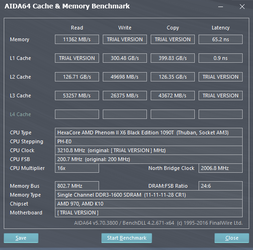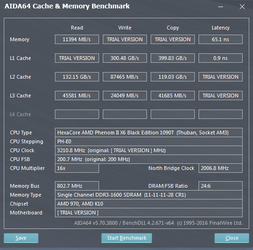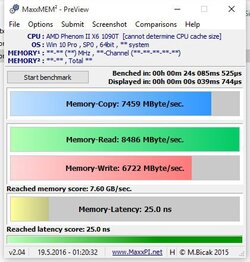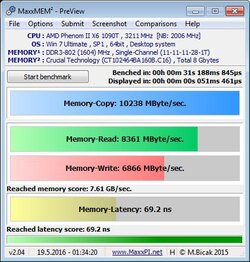Recently I gave Passmark a shot to benchmark my system. It also supports testing for memory read and write speeds as well as latency and it delivers comparison values for other systems. After the test I compared said memory values and had to realize that they were basically half of what similar memory was able to achieve. I'm sporting a single 8GB Crucial CT102464BA160B.C16 DDR3-1600 11-11-11-28 on an Asus M5A97 R2.0 mainboard with an AMD Phenom II X6 1090T BE CPU.

While this is certainly not high performance memory, being off by a factor of 2 seemed a little odd. Further research led me to the following two websites that listed the specs of this type of memory and other benchmarks of it, also done with Passmark:
http://www.memorybenchmark.net/ram_list.php
http://www.memorybenchmark.net/ram.php?ram=Crucial+Technology+CT102464BA160B.C16+8GB&id=3767
The first link lists the following stats which are confirmed by the benchmark on the other link:
Latency: 28ns
Read (uncached): 12622 MB/s
Write: 7964 MB/s
On my system I get the following values:
Latency: 62ns
Read (uncached): 5483 MB/s
Write: 3597 MB/s
I've been going through the BIOS settings and everything's running at stock speeds, so I have no idea where this difference in performance is coming from. Another benchmark webpage showed values that were much closer to my own though, making things even more confusing.
I want to chalk it up to Passmark being an inaccurate test, but if the performance values of my memory are normal, how come Passmark could measure them correctly on my system, but not on countless others? There are too many discrepancies here. Does anyone have an explanation for this disparity? Is it my system, my RAM or Passmark? Are the performance values normal or unusually low?
If someone managed to get more performance out of this memory then I'd be thankful for some information. So far I pushed the timings to 9-10-10-24 while keeping the clock speed at 800MHz.
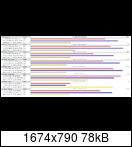
While this is certainly not high performance memory, being off by a factor of 2 seemed a little odd. Further research led me to the following two websites that listed the specs of this type of memory and other benchmarks of it, also done with Passmark:
http://www.memorybenchmark.net/ram_list.php
http://www.memorybenchmark.net/ram.php?ram=Crucial+Technology+CT102464BA160B.C16+8GB&id=3767
The first link lists the following stats which are confirmed by the benchmark on the other link:
Latency: 28ns
Read (uncached): 12622 MB/s
Write: 7964 MB/s
On my system I get the following values:
Latency: 62ns
Read (uncached): 5483 MB/s
Write: 3597 MB/s
I've been going through the BIOS settings and everything's running at stock speeds, so I have no idea where this difference in performance is coming from. Another benchmark webpage showed values that were much closer to my own though, making things even more confusing.
I want to chalk it up to Passmark being an inaccurate test, but if the performance values of my memory are normal, how come Passmark could measure them correctly on my system, but not on countless others? There are too many discrepancies here. Does anyone have an explanation for this disparity? Is it my system, my RAM or Passmark? Are the performance values normal or unusually low?
If someone managed to get more performance out of this memory then I'd be thankful for some information. So far I pushed the timings to 9-10-10-24 while keeping the clock speed at 800MHz.
